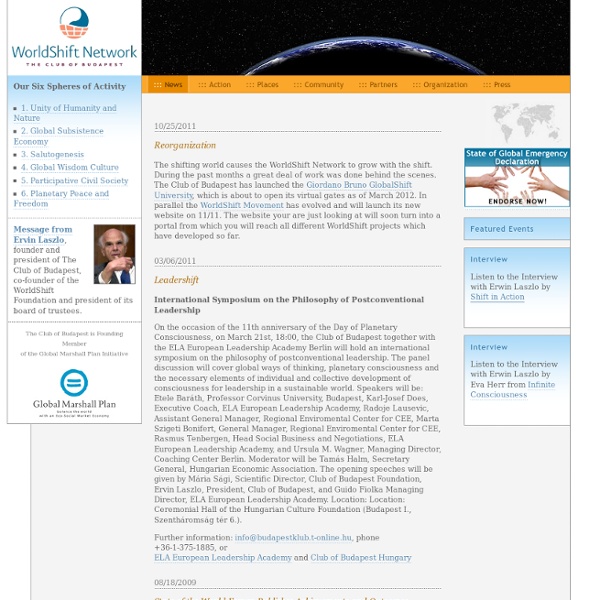



WorldShift Council – Commentary and Analysis of the proceedings of the G-20 WorldShift International Ervin Laszlo: Akasha Think "You can't solve a problem with the same kind of thinking that gave rise to the problem" -- Albert Einstein There is something new on the horizon -- a new kind of thinking. One that could solve the problem -- the entire complex conglomeration of challenges that makes our world unsustainable, intolerant, and prone to violence. This is not thinking out of the blue: It is thinking that has been around for thousands of years. What is new is that it's rediscovered -- of all things, at the cutting edge of the sciences. It is "Akasha think." In this column with my Akashic "A-team" I will review for you the principal dimensions of Akasha think -- the rediscovered revolutionary concept of life and universe, and freedom, wholeness, and wellbeing. Adam and Eve, Socrates and Plato, Constantine and the Crusaders, Henry VIII and Pope Clement VII, Hitler and Churchill, Mother Teresa, Martin Luther King and Gandhi, yes even now Obama and Romney are giving us answers. Try Akasha think. Are you ready?
Ervin Laszlo Ervin László Life[edit] László, son of a shoe manufacturer and a mother who played the piano, started playing the piano when he was five years old, and gave his first piano concert with the Budapest Symphony Orchestra at the age of nine. At the end of the war he came to the United States.[2] Work[edit] In 1984, he was co-founder with Béla H. Bánáthy, Riane Eisler, John Corliss, Francisco Varela, Vilmos Csanyi, Gyorgy Kampis, David Loye, Jonathan Schull and Eric Chaisson of the initially secret General Evolutionary Research Group.[3][4] Meeting behind the Iron Curtain, the group of scientists and thinkers from a variety of disciplines met in secret. In an essay, Stan Grof compared László's work to that of Ken Wilber, saying "Where Wilber outlined what an integral theory of everything should look like, Laszlo actually created one A major distinction appears to be that László (2007)[7] builds his general evolution theory in a more formal, systematic manner. Akashic field theory[edit] Autobiography[edit]
Ma conscience est-elle uniquement la mienne ? La conscience est la faculté mentale d'appréhender de façon subjective les phénomènes extérieurs (par exemple, sous la forme de sensations) ou intérieurs (tels que ses états émotionnels) et plus généralement sa propre existence. Pourtant, de récentes découvertes scientifiques nous proposent de reconcevoir ce modèle sous une forme plus large... © Paul Mezzer La conscience est le fait le plus intimement et immédiatement connu de notre réalité. Celle dont nous disposons tous est unique à chacun et nous accompagne depuis la naissance jusqu’à la mort. Les découvertes actuelles les plus avancées sur la conscience humaine rappellent la déclaration faite par Einstein il y a un demi-siècle : « L’être humain est partie intégrante de tout appelé « univers », une partie limitée dans le temps et l’espace. Les sociétés traditionnelles n’ont jamais considéré les liens transpersonnels avec des personnes, des tribus ou d’autres sociétés modernes. D'autres ont aimé... Sur le même thème...
Science and the Akashic Field Vers une théorie intégrale du tout ? Les mystiques et les sages savent depuis longtemps qu'il existe un champ cosmique reliant tout à tout au plus profond de la réalité, un champ qui conserve et transmet l'information. De récentes découvertes scientifiques indiquent que celui-ci pourrait être réel... Que les théories scientifiques aient ou non un sens sur le plan humain, il est clair qu'elles ne sont pas éternelles. Il arrive de temps en temps que même les théories les plus solides s'effondrent parce que les prédictions qu'elles proposent ne sont plus corroborées par les nouvelles observations. Durant les périodes de révolution scientifique, c'est-à-dire quand un paradigme établi est de plus en plus sur la sellette, les fables des chercheurs avant-gardistes acquièrent une importance particulière. Même si nous ne savons pas encore aujourd'hui laquelle de ces fables deviendra demain une théorie scientifique acceptée, nous pouvons d'ores et déjà dire quel genre y parviendra. D'autres ont aimé... Sur le même thème...